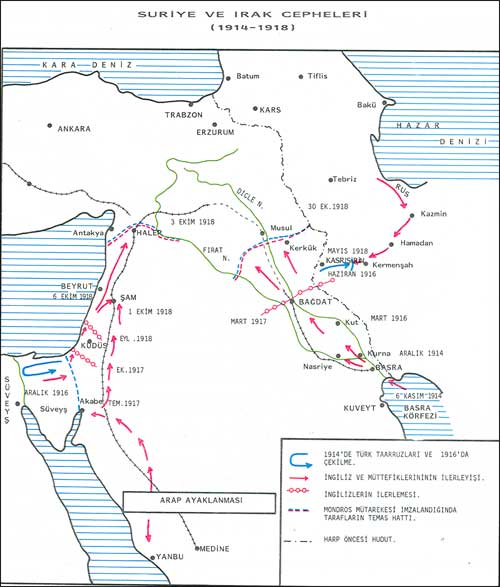a memoir in 1921, in the midst of the Turkish War of
Independence, about the Ottoman Army's retreat from
Palestine in the Fall of 1918, at the end of World War I.
His criticism of the Ottomans' ally Germany and his own
commander Enver Paşa are especially noteworthy.
Major Vecihi took issue with other, non-Turkish, memoirs
of the Great War that put the Turks in a bad light and his
own memoir was intended to set the record straight, at
least from a Turkish perspective.
TNT is transcribing-translating this memoir and will be
publishing it in segments over the next month or so.//

Retreat From Palestine
If one carefully compares our initial entrance into Arabia with this
last exit, a complete idea of the military mistakes we committed can
be attained.
General Staff Major Vecihi
Istanbul - Matbua-i Askeriye (Military Printer)
1337 (1921)
Foreword:
The retreat from Palestine is a sad chapter in the pages regarding
events I participated in during the Great War. I have here quickly
summarized the incidents I witnessed, but without ever deviating
from the truth.
By comparing our first entry into Arabia centuries ago and this latest
exit, one can completely comprehend the administrative and collective
errors we committed. And we understand that it wasn't our enemies
that evicted us from that sacred land but, rather, our friends. We are
right to embrace with pride that magnificent past. The legacy we
inherited may have suffered some damage in passing from then until
now, but we can still take advantage of lessons learned.
If we want to endure, we Turks need not look far into the past for
lessons. The recent past holds lessons enough for us. In order to take
hold of a bright future we must completely unburden ourselves of this
past and determine what it is we need to do and need to know. I firmly
believe that it would be wrong, as we prepare for the future, to adhere
to those old acts and ideas. We would only be deceiving ourselves.
If we want to resemble the nations of Europe, then first let's become a
Turkish nation. Please don't misunderstand the comparison I'm making
here. In my view, by insisting on moving forward and bearing witness
to the lessons of Osman Gazi, doubtless our advance won't take long.
Marching quickly, we, too, will be a valued and distinguished member
of this century's civilization.

Introduction
Many memoirs about the Great War have been published in French,
English and, in fact, in almost every other language. And who knows,
there may be thousands more we don't even know about. I don't know
the views of our citizens, but as a soldier, reading memoirs about
Liman von Sanders, like Ludendorph's, it is hard not to be saddened by
the references to us and our army! Everyone is talking about us but
why is it that we don't talk about ourselves and what we've done. Why
don't we want to know and let others know?
Today there is certainly no sense is remaining silent and humble in the
face of published memoirs that put us in a bad light based on lies and
errors, despite the remarkable sacrifices we made and the skills we
exhibited. It may be that had not many of our compatriots been fighting
in the current national struggle in Anatolia, they would have written
and published many books about the Great War by now. Certainly,
there is no lack of works that sing the praises of our commanders and
the victory at Çanakkale.
But we must not be satisfied with hearing about the retreat from
Palestine, the Iraq expedition, the Caucasus calamity, the Galicia,
Romania and Macedonia adventures solely from foreigners.
//END of PART I//

Hiç yorum yok:
Yorum Gönder